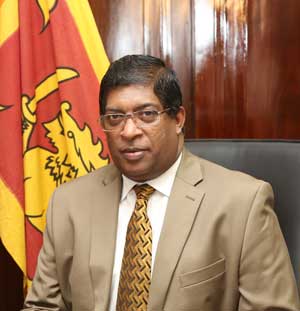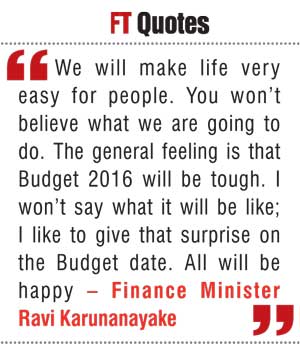Tuesday Feb 17, 2026
Tuesday Feb 17, 2026
Thursday, 5 November 2015 00:00 - - {{hitsCtrl.values.hits}}
Finance Minister Ravi K says Rs. 65 b envisaged as opposed to Rs. 50 b target from one-off retrospective tax
 By Nisthar Cassim
By Nisthar Cassim
Widely criticised by the private sector but justified by the ‘Yahapalana’ Government, the one-off Super Gains Tax (SGT) is expected to bring in much higher revenue, Finance Minister Ravi Karunanayake revealed yesterday.
“We originally estimated Rs. 50 billion from the one-time Super Gains Tax but we are likely to get around Rs. 65 billion,” Karunanayake told a group of editors yesterday at his Ministry.
He said 22 companies had paid the first instalment of SGT which was due by 30 October.
SGT rate is 25% on the taxable income for 2013/14 for any individual or each company including subsidiaries and holding company (including subsidiaries and holding company in a group of companies notwithstanding that the profit before income tax of any such company in the group does not exceed Rs. 2 billion.
The second instalment is due on 30 November and the final portion is on or before 31 December.
Banks have been offered the option of lending to the Government at 6% interest in lieu of the SGT component.
In a meeting to outline the broader objectives of the upcoming Budget, the Finance Minister told editors that extra revenue via new taxes such as SGT was necessary to finance the relief package announced in the 100-Dayprogram of the Yahapalana Government.
He said the cost of most of the relief and stimulus package under the 100-day program was Rs. 220billion. Of this Rs. 120 billion was to be financed via new one-off taxes, the Mansion Tax and other measures. The balance was met by saving Rs. 90 billion expenditure as part of better fiscal prudence. 
The Finance Minister also said that Prime Minister Ranil Wickremesinghe would today (5 November) in Parliament outline the broader future direction of the Government as well as the policy framework.
“The 2016 Budget to be presented on 20 November will be revolutionary and sensational,”Karunanayake said.
Without revealing specific proposals, he said that in terms of taxation, the rich who evade will be compelled to pay taxes whilst those who are compliant will not be burdened. According to the Minister, 60% of the affluent class are not paying taxes.
He also suggested that Budget 2016 would benefit all sections of society. “We will make life very easy for people. You won’t believe what we are going to do. The general feeling is that Budget 2016 will be tough. I won’t say what it will be like; I like to give that surprise on the Budget date. All will be happy,” the Finance Minister assured.
He was of the view that the economy needed to be properly structured, reformed and strengthened. The 2016 Budget will start this process and lay a strong foundation. Ruling out a financial crisis in the country, Minister Karunanayake however clarified the economy was facing several structural issues which would be addressed by the Government. Budget 2016 will be one exercise.
He noted that the public sector salary bill of Rs. 600 billion and pension cost of Rs. 177 billion had to be met, which is 65% of Government income. Additionally, the debt servicing is Rs. 1.3 trillion.
To ensure subsidies are better targeted, the Government will link Samurdhi payments to employment of eligible members of the beneficiary families.
He also said that capital expenditure would be stepped up whilst encouraging local contractors to take on projects.
Karunanayake also described the private sector as “absolute laggards” as they maintain a “wait-and-see” attitude or wait till things fall into their laps. He also opined that when foreigners seize opportunities, the local private sector complains.